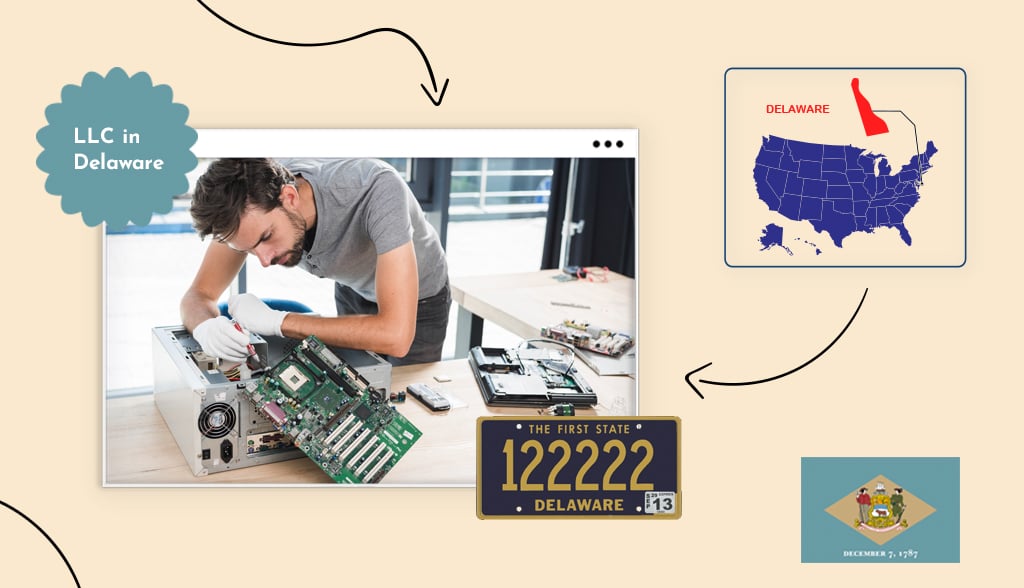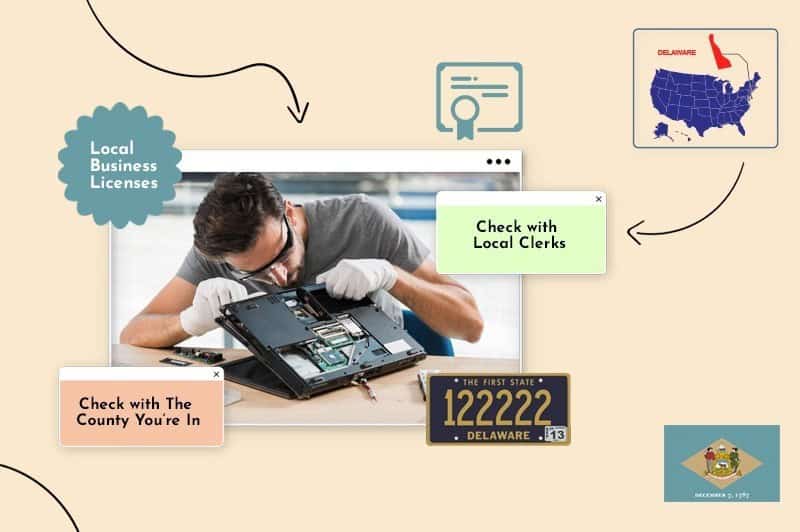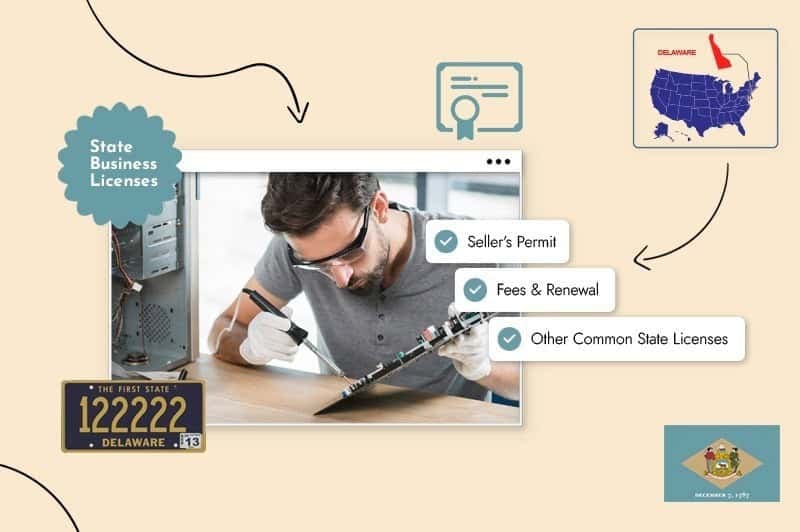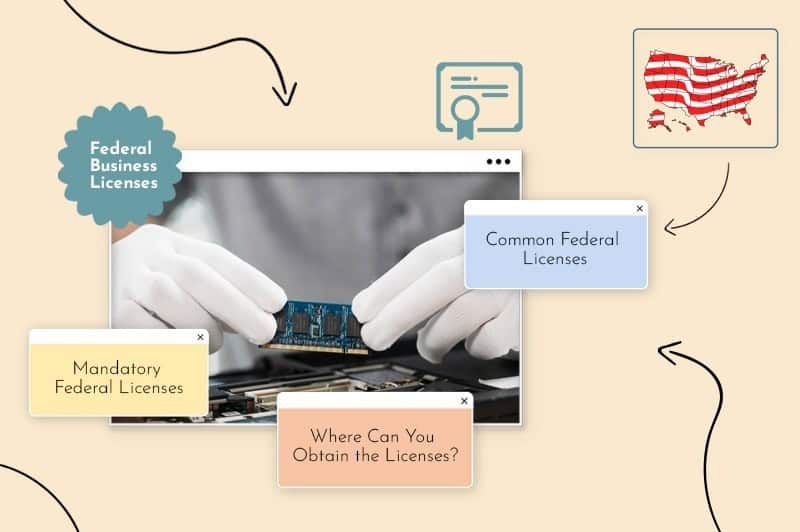
You’ve created your Delaware LLC formation (or any other business entity for that matter), congrats! Your business may need one or more Delaware business licenses. Find out how to get a Delaware seller’s permit and any other business licenses and permits your small business might need from local, state, or federal authorities.
Your small business may need licenses and permits from various government agencies. Both grant permission for specified business activities.
Licenses usually give businesses or professionals permission to render specified services that are otherwise prohibited. If your business needs a license, it’s expected you will adhere to any stipulations or restrictions under that license. (When used in this sense, “service” can include manufacturing, wholesaling, or retailing restricted products.)
Permits likewise usually give businesses or professionals permission to render specified services, but permit permissions tend to be limited by area or time. For example, a vendor might get a permit to sell within city limits during a festival. A contractor might obtain a permit to build a house during a particular calendar period.
The geographic and time restrictions inherent in the terms of most permits are one feature that generally distinguishes permits from licenses. Of course, licenses issued by Delaware are only valid within the state because Delaware doesn’t have authority in other states.
Driving is an excellent example of the general differences between licenses and permits.
A Delaware driver’s license allows you to operate certain classes of vehicles on public roads within the state. All drivers must be licensed, and professional truckers need advanced CDL licenses.
Truckers who transport oversized loads or hazardous materials sometimes also need permits. Permits grant them permission to transport these freights along certain routes and/or at specified times.
Since multiple government agencies issue business licenses and permits, there’s no one process for obtaining all small business licenses. You should check with certain local, state, and federal authorities to ensure your business gets all the necessary licenses.
You may face issues with the overseeing government agency if you do not get a required license or permit.
Your business could face civil penalties and fines depending on the license and agency. Your business would likely also be exposed to substantial liability risks and may have available insurance coverage voided.
For many infractions, your business would probably at least be shut down until obtaining the necessary license. Depending on the application process and current processing time, this could take a few hours to a few weeks. Even a short closure may negatively impact customer satisfaction, production, and sales, especially if the closure comes at a peak time.
Your business could be permanently shuttered for the most severe infractions, and you might even be exposed to potential criminal charges.

Counties and municipalities (including cities, towns, and villages) can require small businesses to obtain licenses or permits. Since each county/municipality has its own requirements, you should check with your local authorities to determine whether your business needs any local licenses.
Your local clerk is the best source for municipal licensing and permitting requirements. Since the clerk likely processes license applications for the municipality, they will be familiar with their city, town, or village’s requirements.
In addition to knowing whether your business should apply for any municipal licenses or permits, the clerk will also be able to explain the application process. If your business has substantial activities in any other municipality, you may also need to check with those clerks.
If you haven’t contacted your local clerk before, you should be able to find their name and contact information (including address, phone, and email) on the municipality’s website. Look for a heading like “departments” if the clerk’s information isn’t easy to locate.
Your county clerk is the best source for county licensing and permitting requirements. County clerks in Delaware are called “clerks of the peace.”
Each of the 3 counties in Delaware has its own clerk of the peace. The clerks’ contact information is as follows:
Should you have any difficulties locating a municipal clerk, these county clerks likely have the contact information for municipal clerks in their county.
The exact licenses and permits your business could need would depend on where in Delaware you’re located. You might need zoning permits (e.g., for businesses in municipalities), health permits (e.g., for serving food and beverages), building permits (e.g., for existing and new construction), or event permits (e.g., for hosting private or public events). This isn’t a comprehensive list of the potential small business licenses you might need.
All businesses operating within the City of Wilmington must obtain a license to conduct business within the city. There are separate applications for vendors and businesses. Further, a State of Delaware business license (see below) is a prerequisite for applying for a Wilmington business license.
Additional licensing requirements are in place for HVAC businesses, edible products retailers, food service businesses, pawnbrokers, secondhand dealers, scrap metal processors, and certain other businesses.

All businesses operating in Delaware are required to obtain a Delaware business license. Certain businesses need additional licenses (e.g., liquor licenses), and some professionals must apply for licensure with the Division of Professional Regulation.
The Delaware business license also functions as a seller’s permit, allowing businesses to provide services and sell goods within the state. In Delaware, the official term for a seller’s permit is simply a “Delaware business license.”
The state’s Division of Revenue issues the Delaware business license, primarily used to remit sales tax and select other taxes. The license is needed when your business commences activity in the state.
You can apply for a Delaware business license on the Delaware One Stop platform. You’ll submit a business license application as part of the account creation process, along with a $75 fee.
Most successful applicants receive their official Delaware business license within 10 days to one month. In the meantime, a temporary license can be printed after completing the account creation process on One Stop.
A business license can also be obtained by mail. Download the “Combined Registration Application for State of Delaware Business License and/or Withholding Agent” (Form CRA). Complete parts A, B, and C, and mail the completed form along with a check payment for the $75 fee. The mailing address is Division of Revenue, PO Box 8750, Wilmington, DE 19899.
Should you need further assistance with the mail-in application, call the Division of Revenue at (302) 577-8778.
An application fee of $75 must be paid when you apply for a Delaware business license.
The license expires on December 31 and can be renewed for 1 to 3 years. Renewing can be completed through your business’ Delaware One Stop account or by completing and returning the form sent to you by the Division of Revenue. The renewal fee is also $75.
Some businesses need additional licenses after they get a Delaware business license (seller’s permit). For example, Delaware normally requires businesses that offer the following services to be specially licensed by the state:
Professionals may also have to be licensed. The Division of Professional Regulation has a complete list of the professions that require licensure and how to apply for professional licenses.

The United States Federal Government has nationwide licensing requirements for specific industries. Regulatory agencies mostly oversee federal licenses; these may be government agencies or quasi-government agencies.
There isn’t any single license needed by all businesses operating in the United States. Industry-specific federal licenses are given by government agencies with jurisdiction within particular industries. Whether your business needs a federal license will depend on its activities and industry.
The following industries are generally subject to federal licensing requirements: alcoholic beverages; ammunition, firearms, and explosives; agriculture; aviation; fish and wildlife; commercial fisheries; maritime transportation; drilling and mining; logistics and transportation; radio and television broadcasting; and nuclear energy. This isn’t an exhaustive list.
If you suspect your business may need a federal business license, contact the appropriate regulatory agency. Someone at the agency can help you confirm whether your business indeed needs to apply for a federal license. They can also help you locate the required forms if you do need to apply.
Every government and agency that oversees business licenses has its own filing process and requirements. In general, you should expect to give basic business details (e.g., business name, location, members and their addresses, and industry). You also usually have to pay a fee, which can range from a few dollars to $100 or more.
Contact the appropriate local, state, or federal agencies to find out the specific application process for any licenses your business needs.
If you’re starting or already have a business in Delaware, be sure the business has all the required licenses and permits. Apply for the Delaware business license and then all local permits, state licenses, and federal licenses needed.
This portion of our website is for informational or educational purposes only. Tailor Brands is not a law firm, and the information on this website does not constitute legal advice. All statements, opinions, recommendations, and conclusions are solely the expression of the author and provided on an as-is basis. Accordingly, Tailor Brands is not responsible for the information and/or its accuracy or completeness. It also does not indicate any affiliation between Tailor Brands and any other brands, services or logos on this page.
Products
Resources
©2025 Copyright Tailor Brands